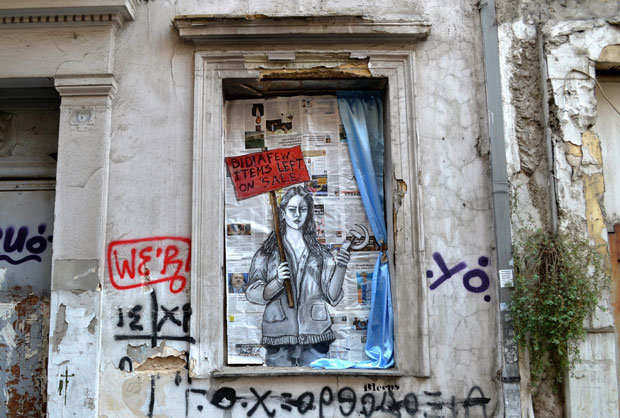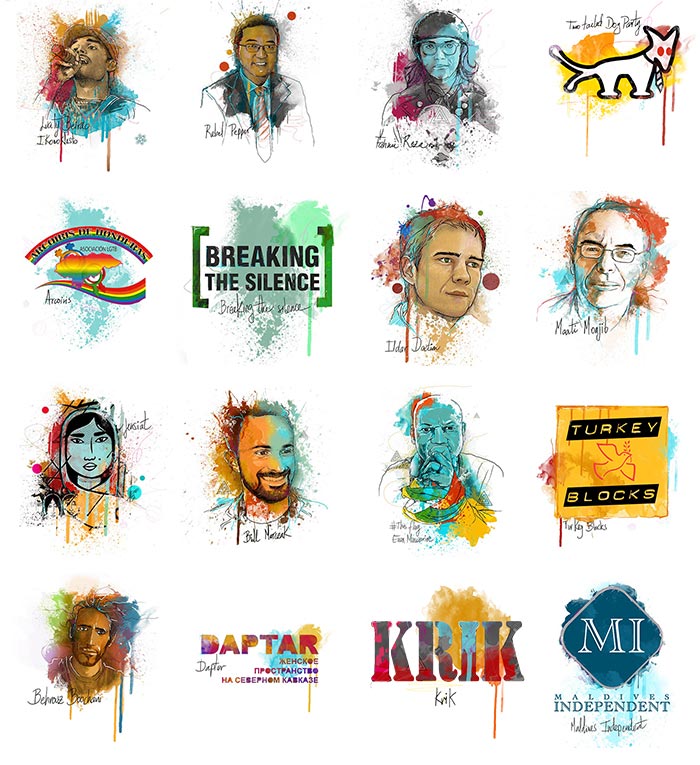7 Nov 2016 | Awards, Awards year slider
[vc_row][vc_column][vc_row_inner equal_height=”yes” content_placement=”middle”][vc_column_inner el_class=”awards-inside-desc”][vc_custom_heading text=”FREEDOM OF EXPRESSION AWARDS 2017″ font_container=”tag:h1|text_align:center” use_theme_fonts=”yes”][vc_video link=”https://www.youtube.com/playlist?list=PLlUhPA3TuB56Ow0JmVsGgeXY5XEy0wwmh” align=”center”][/vc_column_inner][/vc_row_inner][/vc_column][/vc_row][vc_row full_width=”stretch_row”][vc_column][vc_custom_heading text=”2017 Fellows” font_container=”tag:h1|text_align:center” use_theme_fonts=”yes”][vc_column_text]
Selected from over 400 public nominations and a shortlist of 16, the 2017 Freedom of Expression Awards Fellows exemplify courage in the face of censorship. Learn more about the fellowship.
[/vc_column_text][vc_row_inner][vc_column_inner width=”1/4″][vc_single_image image=”84888″ img_size=”full” onclick=”custom_link” link=”https://www.indexoncensorship.org/2017/04/arts-fellow-2017/”][vc_column_text]
[/vc_column_text][/vc_column_inner][vc_column_inner width=”1/4″][vc_single_image image=”84882″ img_size=”full” onclick=”custom_link” link=”https://www.indexoncensorship.org/2017/04/campaigning-fellow-2017/”][vc_column_text]
[/vc_column_text][/vc_column_inner][vc_column_inner width=”1/4″][vc_single_image image=”84889″ img_size=”full” onclick=”custom_link” link=”https://www.indexoncensorship.org/2017/04/digital-activism-2017/”][vc_column_text]
[/vc_column_text][/vc_column_inner][vc_column_inner width=”1/4″][vc_single_image image=”84887″ img_size=”full” onclick=”custom_link” link=”https://www.indexoncensorship.org/2017/04/journalism-2017/”][vc_column_text]
[/vc_column_text][/vc_column_inner][/vc_row_inner][/vc_column][/vc_row][vc_row full_width=”stretch_row” css=”.vc_custom_1500367746306{background-color: #f2f2f2 !important;}”][vc_column][awards_gallery_slider name=”2017 AWARDS GALA” images_url=”89583,89582,89581,89580,89577,89578,89576,89575,89574,89565,89560,89559,89553,89552,89551,89550,89549,89548,89547,89546,89545,89544,89543,89542,89541,89540,89539,89538,89537,89536,89535,89534,89533,89532,89531,89530,89529,89528,89527,89526,89525,89524,89523,89522,89520,89521,89519,89518,89517,89515,89513,89512,89511,89510,89509″][vc_column_text]
The Awards were held at London’s Unicorn Theatre on Wednesday 19 April 2017.
High-resolution images are available for download via Flickr.
[/vc_column_text][/vc_column][/vc_row][vc_row full_width=”stretch_row” equal_height=”yes” css=”.vc_custom_1500374640894{margin-top: 20px !important;margin-bottom: 20px !important;}”][vc_column width=”1/2″][vc_custom_heading text=”Support the Index Awards.” font_container=”tag:p|font_size:28|text_align:center” use_theme_fonts=”yes” link=”url:https%3A%2F%2Fwww.indexoncensorship.org%2Fsupport-the-freedom-of-expression-awards%2F|||”][vc_column_text]
By donating to the Freedom of Expression Awards you help us support individuals and groups at the forefront of tackling censorship.
Find out more
[/vc_column_text][/vc_column][vc_column width=”1/2″ css=”.vc_custom_1500374612115{background-image: url(https://www.indexoncensorship.org/wp-content/uploads/2017/05/EMK_3669web-Edit-1490x460_revised.jpg?id=90091) !important;background-position: center !important;background-repeat: no-repeat !important;background-size: cover !important;}”][/vc_column][/vc_row][vc_row full_width=”stretch_row” css=”.vc_custom_1500374723834{background-color: #f2f2f2 !important;}”][vc_column][vc_custom_heading text=”2017 SHORTLIST” font_container=”tag:h1|text_align:center” use_theme_fonts=”yes”][vc_tta_tabs][vc_tta_section title=”Arts” tab_id=”1500362988336-5bdbb85d-772be509-a00f”][vc_row_inner][vc_column_inner width=”1/2″][vc_column_text]
ARTS
for artists and arts producers whose work challenges repression and injustice and celebrates artistic free expression
[/vc_column_text][/vc_column_inner][vc_column_inner width=”1/2″][vc_video link=”https://www.youtube.com/watch?v=SxXBCcuFOGQ”][/vc_column_inner][/vc_row_inner][vc_row_inner content_placement=”middle” el_class=”container container980″][vc_column_inner width=”1/4″][vc_single_image image=”84885″ img_size=”full” add_caption=”yes” onclick=”custom_link” img_link_target=”_blank” link=”https://www.indexoncensorship.org/2017/03/index-awards-luaty-beirao/”][/vc_column_inner][vc_column_inner width=”1/4″][vc_single_image image=”84888″ img_size=”full” add_caption=”yes” onclick=”custom_link” img_link_target=”_blank” link=”https://www.indexoncensorship.org/2017/03/indexawards2017-rebel-pepper-china-caroonist/”][/vc_column_inner][vc_column_inner width=”1/4″][vc_single_image image=”84881″ img_size=”full” add_caption=”yes” onclick=”custom_link” img_link_target=”_blank” link=”https://www.indexoncensorship.org/2017/03/fahmi-reza-art-weapon-against-corruption/”][/vc_column_inner][vc_column_inner width=”1/4″][vc_single_image image=”84890″ img_size=”full” add_caption=”yes” onclick=”custom_link” img_link_target=”_blank” link=”https://www.indexoncensorship.org/2017/03/index-awards-hungary-two-tailed-dog-party/”][/vc_column_inner][/vc_row_inner][/vc_tta_section][vc_tta_section title=”Campaigning” tab_id=”1500362988646-d5275c82-89e2e509-a00f”][vc_row_inner][vc_column_inner width=”1/2″][vc_column_text]
CAMPAIGNING
for activists and campaigners who have had a marked impact in fighting censorship and promoting freedom of expression
Supported by Doughty Street Chambers
[/vc_column_text][/vc_column_inner][vc_column_inner width=”1/2″][vc_video link=”https://youtu.be/vQcwVRmGHII”][/vc_column_inner][/vc_row_inner][vc_row_inner][vc_column_inner width=”1/4″][vc_single_image image=”84876″ img_size=”full” add_caption=”yes” onclick=”custom_link” img_link_target=”_blank” link=”https://www.indexoncensorship.org/2017/03/arcoiris-lgbt-honduras/”][/vc_column_inner][vc_column_inner width=”1/4″][vc_single_image image=”84879″ img_size=”full” add_caption=”yes” onclick=”custom_link” img_link_target=”_blank” link=”https://www.indexoncensorship.org/2017/03/index-awards-breaking-silence/”][/vc_column_inner][vc_column_inner width=”1/4″][vc_single_image image=”84882″ img_size=”full” add_caption=”yes” onclick=”custom_link” img_link_target=”_blank” link=”https://www.indexoncensorship.org/2017/03/ildar-dadin-russian-activist/”][/vc_column_inner][vc_column_inner width=”1/4″][vc_single_image image=”84886″ img_size=”full” add_caption=”yes” onclick=”custom_link” img_link_target=”_blank” link=”https://www.indexoncensorship.org/2017/03/maati-monjib-free-speech-morocco/”][/vc_column_inner][/vc_row_inner][/vc_tta_section][vc_tta_section title=”Digital Activism” tab_id=”1500375693353-6cf89875-d61ee509-a00f”][vc_row_inner][vc_column_inner width=”1/2″][vc_column_text]
DIGITAL ACTIVISM
for innovative uses of technology to circumvent censorship and enable free and independent exchange of information
Supported by Private Internet Access
[/vc_column_text][/vc_column_inner][vc_column_inner width=”1/2″][vc_video link=”https://youtu.be/6VDEpJYlB5s”][/vc_column_inner][/vc_row_inner][vc_row_inner][vc_column_inner width=”1/4″][vc_single_image image=”84883″ img_size=”full” add_caption=”yes” onclick=”custom_link” img_link_target=”_blank” link=”https://www.indexoncensorship.org/2017/04/jensiat-cyber-security-sexuality-iran/”][/vc_column_inner][vc_column_inner width=”1/4″][vc_single_image image=”84878″ img_size=”full” add_caption=”yes” onclick=”custom_link” img_link_target=”_blank” link=”https://www.indexoncensorship.org/2017/04/bill-marczak-spyware/”][/vc_column_inner][vc_column_inner width=”1/4″][vc_single_image image=”84875″ img_size=”full” add_caption=”yes” onclick=”custom_link” img_link_target=”_blank” link=”https://www.indexoncensorship.org/2017/04/evan-mawarire-hope-nation/”][/vc_column_inner][vc_column_inner width=”1/4″][vc_single_image image=”84889″ img_size=”full” add_caption=”yes” onclick=”custom_link” img_link_target=”_blank” link=”https://www.indexoncensorship.org/2017/04/turkey-blocks-win-back-internet/”][/vc_column_inner][/vc_row_inner][/vc_tta_section][vc_tta_section title=”Journalism” tab_id=”1500375685814-07dc032c-abfae509-a00f”][vc_row_inner][vc_column_inner width=”1/2″][vc_column_text]
JOURNALISM
for courageous, high-impact and determined journalism that exposes censorship and threats to free expression
Supported by CNN
[/vc_column_text][/vc_column_inner][vc_column_inner width=”1/2″][vc_video link=”https://youtu.be/aczK0uN0ytU”][/vc_column_inner][/vc_row_inner][vc_row_inner][vc_column_inner width=”1/4″][vc_single_image image=”84877″ img_size=”full” add_caption=”yes” onclick=”custom_link” img_link_target=”_blank” link=”https://www.indexoncensorship.org/2017/04/kurdish-journalist-behrouz-boochani/”][/vc_column_inner][vc_column_inner width=”1/4″][vc_single_image image=”84880″ img_size=”full” add_caption=”yes” onclick=”custom_link” img_link_target=”_blank” link=”https://www.indexoncensorship.org/2017/04/daptar-hope-women-dagestan/”][/vc_column_inner][vc_column_inner width=”1/4″][vc_single_image image=”85704″ img_size=”full” add_caption=”yes” onclick=”custom_link” img_link_target=”_blank” link=”https://www.indexoncensorship.org/2017/04/krik-crime-corruption-serbia/”][/vc_column_inner][vc_column_inner width=”1/4″][vc_single_image image=”84887″ img_size=”full” add_caption=”yes” onclick=”custom_link” img_link_target=”_blank” link=”https://www.indexoncensorship.org/2017/04/maldives-independent-hold-government-to-account/”][/vc_column_inner][/vc_row_inner][/vc_tta_section][/vc_tta_tabs][/vc_column][/vc_row][vc_row full_width=”stretch_row”][vc_column][vc_custom_heading text=”2017 JUDGING PANEL” font_container=”tag:h1|text_align:center” use_theme_fonts=”yes”][vc_row_inner][vc_column_inner width=”1/3″][staff name=”Noma Dumezweni” title=”Actor” profile_image=”85068″]Noma Dumezweni, who plays Hermione in the stage play Harry Potter and the Cursed Child, was shortlisted in 2016 for an Evening Standard Theatre Award for Best Actress. Speaking about the importance of the Index Awards she said: “Freedom of expression is essential to help challenge our perception of the world”.[/staff][/vc_column_inner][vc_column_inner width=”1/3″][staff name=”Caoilfhionn Gallagher QC” title=”Barrister” profile_image=”85067″]Caoilfhionn Gallagher is a public law specialist at Doughty Street Chambers who represented the bereaved families in the 7/7 London bombings, and the Hillsborough football stadium tragedy. In October 2016 she was named Human Rights and Public Law Junior of the Year at the Chambers UK Bar Awards.[/staff][/vc_column_inner][vc_column_inner width=”1/3″][staff name=”Tina Brown” title=”Journalist and editor” profile_image=”82577″]Tina Brown is an award-winning journalist and former editor-in-chief of Tatler, Vanity Fair and The New Yorker. She is founder of Women in the World Summits.[/staff][/vc_column_inner][/vc_row_inner][vc_row_inner][vc_column_inner width=”1/3″][staff name=”Anab Jain” title=”Tech entrepreneur” profile_image=”82573″]Anab Jain is a TED fellow and co-founder of Superflux.[/staff][/vc_column_inner][vc_column_inner width=”1/3″][staff name=”Stephen Budd” title=”Music manager” profile_image=”82576″]Stephen Budd is chairman of the Music Managers Forum and co-founder of Damon Albarn’s ‘Africa Express’ musical collaborations project.[/staff][/vc_column_inner][vc_column_inner width=”1/3″][staff name=”Jodie Ginsberg” title=”CEO, Index on Censorship” profile_image=”80210″]Jodie Ginsberg joined Index on Censorship from the think-tank, Demos. A former London Bureau Chief for Reuters, Jodie worked for more than a decade as a foreign correspondent and business journalist. She was previously Head of Communications for Camfed, a non-profit organisation working in girls’ education.[/staff][/vc_column_inner][/vc_row_inner][vc_column_text]Each year Index recruits an independent panel of judges – leading voices with diverse expertise across campaigning, journalism, the arts and human rights. Judges look for courage, creativity and resilience. We shortlist on the basis of those who are deemed to be making the greatest impact in tackling censorship in their chosen area, with a particular focus on topics that are little covered or tackled by others. Where a judge comes from a nominee’s country, or where there is any other potential conflict of interest, the judge will abstain from voting in that category.
The Freedom of Expression Awards are open to anyone involved in tackling free expression threats – either through journalism, campaigning, the arts or using digital techniques – is eligible for nomination. Any individual, group or NGO can nominate or self-nominate. There is no cost to apply. Nominees must have had a recognisable impact in the past 12 months.[/vc_column_text][/vc_column][/vc_row][vc_row full_width=”stretch_row” css=”.vc_custom_1500374747691{margin-top: 20px !important;margin-bottom: 20px !important;padding-top: 20px !important;padding-right: 15px !important;padding-bottom: 20px !important;padding-left: 15px !important;background-color: #f2f2f2 !important;}”][vc_column][vc_row_inner content_placement=”middle” el_class=”container container980″][vc_column_inner][awards_news_slider name=”2017 COVERAGE” years=”2017″][/vc_column_inner][/vc_row_inner][/vc_column][/vc_row][vc_row full_width=”stretch_row” css=”.vc_custom_1500374757272{margin-top: 20px !important;padding-top: 20px !important;padding-bottom: 20px !important;}”][vc_column][vc_row_inner][vc_column_inner][vc_custom_heading text=”SPONSORS” font_container=”tag:h1|text_align:center” use_theme_fonts=”yes” css=”.vc_custom_1484567001197{margin-bottom: 30px !important;}”][vc_column_text]
The Freedom of Expression Awards and Fellowship have massive impact. You can help by sponsoring or supporting a fellowship.
Index is grateful to those who supported the 2017 Awards:
[/vc_column_text][/vc_column_inner][/vc_row_inner][vc_row_inner equal_height=”yes” el_class=”container container980″][vc_column_inner width=”1/2″ offset=”vc_col-xs-6″][vc_single_image image=”80918″ img_size=”234×234″ alignment=”center” onclick=”custom_link” img_link_target=”_blank” link=”https://uk.sagepub.com/”][vc_single_image image=”85983″ img_size=”234×234″ alignment=”center” onclick=”custom_link” link=”https://www.privateinternetaccess.com/”][/vc_column_inner][vc_column_inner width=”1/2″ offset=”vc_col-xs-6″][vc_single_image image=”80921″ img_size=”234×234″ alignment=”center” onclick=”custom_link” img_link_target=”_blank” link=”https://www.google.co.uk/about/”][vc_single_image image=”82019″ img_size=”234×234″ alignment=”center” onclick=”custom_link” link=”http://edition.cnn.com/”][/vc_column_inner][/vc_row_inner][vc_row_inner equal_height=”yes” el_class=”container container980″][vc_column_inner width=”1/3″ offset=”vc_col-xs-6″][vc_single_image image=”82003″ alignment=”center” onclick=”custom_link” img_link_target=”_blank” link=”http://www.vodafone.com/content/index.html#”][/vc_column_inner][vc_column_inner width=”1/3″ offset=”vc_col-xs-6″][vc_single_image image=”82323″ alignment=”center” onclick=”custom_link” link=”https://news.vice.com/”][/vc_column_inner][vc_column_inner width=”1/3″ offset=”vc_col-xs-6″][vc_single_image image=”80923″ img_size=”medium” alignment=”center” onclick=”custom_link” img_link_target=”_blank” link=”http://www.doughtystreet.co.uk/”][/vc_column_inner][/vc_row_inner][vc_row_inner equal_height=”yes” el_class=”container container980″][vc_column_inner width=”1/4″ offset=”vc_col-xs-6″][vc_single_image image=”80924″ alignment=”center” onclick=”custom_link” img_link_target=”_blank” link=”https://psiphon.ca/”][/vc_column_inner][vc_column_inner width=”1/4″ offset=”vc_col-xs-6″][vc_single_image image=”82758″ alignment=”center” onclick=”custom_link” link=”http://www.gorkana.com/”][/vc_column_inner][vc_column_inner width=”1/4″ offset=”vc_col-xs-6″][vc_single_image image=”85977″ img_size=”150×150″ alignment=”center” onclick=”custom_link” link=”http://www.edwardian.com/”][/vc_column_inner][vc_column_inner width=”1/4″][vc_single_image image=”85975″ alignment=”center” onclick=”custom_link” img_link_target=”_blank” link=”http://flyingdogbrewery.com/”][/vc_column_inner][/vc_row_inner][vc_column_text]
If you are interested in sponsorship you can contact [email protected]
[/vc_column_text][/vc_column][/vc_row]
21 Sep 2016 | Magazine, mobile, News and features, Volume 45.02 Summer 2016 Extras, Youth Board
In the latest issue of Index on Censorship magazine, The Unnamed: Does anonymity need to be defended?, Index’s contributing editor for Turkey, Kaya Genç, explores anonymous artists in Turkey. In the piece the artists discuss how vital anonymity is in allowing them to complete their more controversial work. The Index on Censorship youth advisory board have taken inspiration from this piece for their latest task, in which they investigate anonymous art around the world.
Keizer by Constantin Eckner

Ants feature in Keizer’s work to sybolise “the forgotten ones, the silenced, the nameless, those marginalised by capitalism”. Image: Keizer
Prior to the January 25 Revolution political street art was anything but common in Egypt, yet it has proliferated in public spaces in the aftermath of the revolution. One of the most productive street artists in Cairo is Keizer, who has gained popularity and notoriety in recent years. Like Banksy and other street artists, he uses the well-known stencil technique to empower his fellow countrymen, and people in general, with his thought-provoking work. He likens people to ants, which are featured in most of his graffiti. Keizer explains on his Facebook account that the ant “symbolises the forgotten ones, the silenced, the nameless, those marginalised by capitalism. They are the working class, the common people, the colony that struggles and sacrifices blindly for the queen ant and her monarchy.”
Asked about the reason for protecting his identity, Keizer said: “I am very concerned over my safety and the repercussions of street art which I’ve already had a taste of, especially with this current regime. Including death threats,

Egyptian street artist Keizer has gained popularity in recent years. Image: Keizer
my twitter account was hacked twice. In the past five years of working on the street I’ve been caught once. I came out of it with a few bumps and bruises, nothing major. I consider myself lucky that I came out one day later.
“You can imagine that being caught here is very different than being caught in Europe. There is no proper procedure and that makes you a victim of the person handling you, and the uncertainty of what comes next. Graffiti is a grey area here, they don’t have any definition or classification for it in the books, so they make it up as they go along, taking you for the fear ride. It’s all under vandalism, so they can make it look small or escalate it to exaggerated levels. For instance, you can be dubbed as a political traitor; it can be considered racketeering; they can glue your name to any political movement unpopular with the people…etc.”
Tall walls, low profiles: Icy and Sot by Layli Foroudi
Icy and Sot describe themselves as stencil artists from Tabriz, Iran. As for their identities, they reveal only that they are brothers, born in 1985 and 1991. Their work is created under pseudonyms in countries around the world, including Iran, USA, Germany, Norway, and China, on legal and illegal walls as well as in galleries.
The anonymous duo, who paint on themes like human rights, censorship, and justice, say that charges against artists in Iran make going public risky.
“Pseudonyms help us to keep a low profile,” the brothers explained in an interview with ArtInfo, “Being arrested in Iran is completely different, because they charge you with crimes that you have not even committed, like Satanism or political crimes.”
Their work often uses striking human faces in black and white to make statements about politics and the environment, to call for peace, and to direct messages at the government of Iran. In 2015, Icy and Sot used their art to protest for freedom of expression in Iran, prompted by the arrest and 18-month imprisonment of Atena Farghadani, an Iranian artist who was detained for publishing a cartoon that satirised the Iranian government as animals. In solidarity, they stenciled a tribute piece depicting Farghadani with a backdrop of protesters on a wall in Brooklyn.
Maeztro Urbano’s fight to change a criminal image by Ian Morse.
In the most recent data, Honduras has the highest homicide rate in the world, with 84 intentional homicides per 100,000 people in 2013. The prominence of drug trafficking and ubiquity of poverty does not improve its reputation.
To some Hondurans, their country’s international image has done nothing but hurt citizen’s attempts to improve daily life in the country’s bustling cities and lively cultural centers. Maeztro Urbano and his friends became the face of an urban street art project to disrupt the atmosphere of crime and reveal another side of the country outside of the headlines.
His projects range from adjusting street signs promoting gender equality to vandalising billboards with corrupt politicians, to wall graffiti showing the effect of violence on children. Working his day shifts in the advertising industry, Maeztro Urbano said he wants to contribute more to his country than proliferating consumerism.
“Change should start within society. With each individual,” El Maestro – as he is also called – told The Creators Project. “To have respect for the lives of others, to respect the right to sexual diversity, to a better education.”
“If we don’t change that as a society and as individuals, we will never be able to change as a country.”
Assailants in Honduras have not been very hospitable to those reporting on crime or those wishing to express their identity. Faced with police harassment and shootings from unknown attackers, Maeztro Urbano chooses to wear a mask while he works to spread messages of hope around the country.
Bleeps.gr: Over a decade of political artivism in Athens by Anna Gumbau.

Bleeps.gr is one of Greece’s most prominent street artists, having painted murals on the streets of Athens for over 10 years. Image: Bleeps.gr
“I have been radically oriented to the political discourse, utilising the public sphere, and I am not afraid or discouraged”, Bleeps.gr, one of the most prominent Greek street artists, told Index.
Bleep.gr has been designing murals, that are mostly critical of the austerity policies imposed to Greece, on the streets of Athens for over 10 years. The Greek social turmoil has had a strong influence on his artwork, not only in his scenes, but even in his methods. “I buy very cheap materials and can’t afford those impressive equipment to create a mural”, he said in an interview with Street Art Europe.
Bleeps.gr chooses to use a pseudonym as an attempt to challenge “the institutionalised perception of the identity”, he told Index. While he is not afraid of the state authorities, he points at art institutions, such as galleries, exhibitions and festivals, who reject and exclude his art. “Most of the censorship I have received has come from other artists, especially the ones related to systemic initiatives, who in the past years have removed all of my works from the city center” he said. Greek political street artists often suffer from the exclusion of art galleries and exhibitors; in the summer of 2013, the CRISIS? WHAT CRISIS? street art festival in Athens, which celebrates the value of street art in the current political happenings, invited 20 artists from different European countries but failed to invite any Greek artists.
Nevertheless, Bleeps.gr stresses the fact that the internet “has provided a virtual field of allocation”, and most of the political street art discourse happens there.
Bleeps.gr highlights the mechanisms of such institutions to “absorb street artists” and make them become part of the art “business”, adding: “the majority of them nowadays serve gentrification policies and turn policies and turn political art into a spectacle for tourist pleasure”.
King of Spades by Sophia Smith-Galer.
When it comes to anonymous artists, the art tends to speak far louder than any speculation into the artist themselves. This anonymous artist in Lebanon is no Arab Banksy that lurks tantalisingly close to the limelight; this artist could quite literally be anyone, and the lack of anybody claiming the piece as their own is revelatory of the grave reality of artists in developing countries that test the patience of despots and tyrants.
Despite its tired and no longer relevant label “Paris of the Middle East”, even the dazzlingly artistic city of Beirut, Lebanon, can’t quite get away with hanging something like this banner, depicting the late Saudi Arabian monarch King Abdullah bin Abdul Aziz as a brutal King of Spades. Shortly after its creation in 2013, the Lebanese state prosecutor ordered an investigation to reveal the source of these posters after complaints from Saudi Ambassador Ali Awad Asiri.
It seems that nobody got caught, and nor do I particularly want to dwell on what would have happened to the artist if they had. But in the Middle East, such a daring artistic expression must be forbidden fruit in a region of gagged political artistry; demonstrated no better than in this mysterious artist who gambled with the assumed impunity of that gentleman with the bloodied scimitar.
Dede Bandaid by Shruti Venkatraman.

One of Dede Bandaid’s most well known works, a missile target painted in the middle of a large car park, a reference to the Gaza conflict in 2014. Image: Dede Bandaid / Wikicommons
Dede Bandaid is an anonymous Israeli artist who has added colour to Tel Aviv’s streets with thought provoking and politically relevant street art. His artistic career began in 2000 during his compulsory military service, and most of his earlier pieces demonstrated a clear anti-establishment sentiment. His more recent works, following the end of his stint in the military, aim to communicate social and political messages. One of his most well known works is a missile target painted in the middle of a large car park, a reference to the Gaza conflict in 2014.
Dede enjoys using public spaces as a canvas as this approach allows freer and more controversial expression, while also being accessible to and viewable by a larger audience especially when the street art is photographed and its images are circulated online. He also makes use of traditional symbols of peace, like the white dove, and frequently incorporates Band-Aids that represent healing and remedy in his artwork, with “Bandaid” being the pseudonym he signs on all his pieces. Over time, Dede’s style has evolved from stencilling to free-hand painting and collage and he interestingly also exhibits certain pieces in galleries across the world.
Cabbage Walker in Kashmir by Niharika Pandit.
A pheran-clad man walks around with a cabbage on a leash in the neighbourhoods of Srinagar, Kashmir. This performance act that he presents is inspired by Chinese artist Han Bing’s “Walking the Cabbage” social intervention work. While Bing chose to walk the cabbage to reflect on the changing values in the Chinese society, where once cabbage was a subsistence food product but is now only embraced by the poor, in Kashmir, this anonymous artist aims to normalise the cabbage walking to show the absurdity of militarisation in the region. Both the performances employ cabbage as an element of satire to expose the irony inherent in what how elitism and militarisation come to be normalised in societies across the world.
The Kashmiri Cabbage Walker writes on his blog, “I as a Kashmiri am willing to recognise walking the cabbage as part of the Kashmiri landscape but I will never accept the check posts, the bunkers, the army camps, the torture centers, the barbed wire, the curfews, the arrests, the toxic environment of conflict and war, as part of the same.”
This performance artist chooses to remain anonymous as it helps in focusing on the message and not the messenger. The Kashmiri Cabbage Walker says that he represents all Kashmiri lives under militarisation thereby revealing the artist’s identity becomes unimportant here.
Cracked pavements in Budapest by Fruzsina Katona.

Anonymous volunteers have joined the satirial political party the Two-Tailed Dog party (MKKP) to paint cracked pavement on the streets of Budapest. Image: Fruzsina Katona
Anonymity does not necessarily mean that one is trying to hide his or her identity. Sometimes the identity of the person is utterly irrelevant. In Budapest, several anonymous volunteers are painting the streets of the city.
The pavement on the streets of the Hungarian capital are falling apart, ruining the image of the city and endangering those who walk on it. Authorities are known to do very little to fix the problem, but something had to be done. Hungary’s satiric political party, the Two-Tailed Dog party (MKKP) called for action and its artsy, anonymous volunteers started colouring the cracked pavement pieces resulting in dozens of cheerful spots across the city.
Unfortunately, there are some who find quarrels in a straw, and the police were called on the ad-hoc artists while they were peacefully decorating the pavement in a touristic neighbourhood. Now the volunteers are being prosecuted with vandalism.
But we still do not know their identity or how many of them are out decorating. All we know is that now we look at colourful patches of pavements while running our errands, instead of the sad and ugly cracked pavements.
22 Jun 2016 | Honduras, mobile, News and features

Honduran journalist Cesario Padilla
Honduran journalist Cesario Padilla is facing immediate detention and a possible five-year jail term after being present at student protests at the National Autonomous University of Honduras in Tegucigalpa.
A warrant was issued for his arrest on 7 June. He and five others have been charged with “usurpation” of university property during protests, which saw buildings occupied and classes shutdown at UNAH’s two campuses in Tegucigalpa and in San Pedro Sula. The students were protesting against the introduction of higher pass grades and rising fees, as well as calling for the student body to play more of a role in the university’s governance.
Padilla said he was at the protests to observe as a reporter. The other accused students – Moisés David Cáceres, Sergio Luis Ulloa, Josué Armando Velásquez, Dayanara Elizabeth Castillo and Izhar Asael Alonzo Matamoros – were reportedly not present at the protests, but it is thought they are being accused of playing an organisational role.
Padilla works alongside former Index on Censorship awards nominee Dina Meza on the news website she launched in April 2015, Pasos de Animal Grande (Steps of a Big Animal).
Padilla was also interviewed in a 2014 piece Meza wrote for Index on Censorship magazine about the struggles young journalists in Honduras face when entering a profession where fear and corruption have become the driving forces.
In 2014, Padilla and five UNAH students, including Cáceres, Castillo and Ulloa, were suspended from the university after taking part in similar protests. They were subsequently re-admitted after a ruling by the Honduran Supreme Court of Justice in February 2015.
Padilla is a member of Pen Honduras. Read Pen International’s call to action here.
Related:
Homofobia en Honduras: el aumento de atracos y asesinatos de activistas LGBT
Homophobia in Honduras: growing attacks on LGBT activists
13 Apr 2016 | Awards, mobile, Music in Exile, News and features

Each year, the Index on Censorship Freedom of Expression Awards gala honours courageous champions who fight for free speech around the world.
Drawn from more than 400 crowdsourced nominations, this year’s nominees include artists, journalists, campaigners and digital activists tackling censorship and fighting for freedom of expression. Many of the 16 shortlisted are regularly targeted by authorities or by criminal and extremist groups for their work: some face regular death threats, others criminal prosecution.
The gala takes place Wednesday 19 April at the Unicorn Theatre in London and will be hosted by comedian, actor and writer Katy Brand. If you aren’t lucky enough to be attending, you can catch the night’s events by tuning into coverage and a live Periscope stream @IndexCensorship beginning at 7:30PM BST.
We will be live tweeting throughout the evening on @IndexCensorship. Get involved in the conversation using the hashtag #IndexAwards2017.
Index on Censorship Freedom of Expression Awards nominees 2017
Arts

Luaty Beirão, Angola
Rapper Luaty Beirão, also known as Ikonoklasta, has been instrumental in showing the world the hidden face of Angolan President José Eduardo dos Santos’s rule. For his activism Beirão has been beaten up, had drugs planted on him and, in June 2015, was arrested alongside 14 other people planning to attend a meeting to discuss a book on non-violent resistance. Since being released in 2016, Beirão has been undeterred attempting to stage concerts that the authorities have refused to license and publishing a book about his captivity entitled “I Was Freer Then”, claiming “I would rather be in jail than in a state of fake freedom where I have to self-censor”.
Rebel Pepper, China
Wang Liming, better known under the pseudonym Rebel Pepper, is one of China’s most notorious political cartoonists. For satirising Chinese Premier Xi Jinping and lampooning the ruling Communist Party, Rebel Pepper has been repeatedly persecuted. In 2014, he was forced to remain in Japan, where he was on holiday, after serious threats against him were posted on government-sanctioned forums. The Chinese state has since disconnected him from his fan base by repeatedly deleting his social media accounts, he alleges his conversations with friends and family are under state surveillance, and self-imposed exile has made him isolated, bringing significant financial struggles. Nonetheless, Rebel Pepper keeps drawing, ferociously criticising the Chinese regime.
Fahmi Reza, Malaysia
On 30 January 2016, Malaysian graphic designer Fahmi Reza posted an image online of Prime Minister Najib Razak in evil clown make-up. From T-shirts to protest placards, and graffiti on streets to a sizeable public sticker campaign, the image and its accompanying anti-sedition law slogan #KitaSemuaPenghasut (“we are all seditious”) rapidly evolved into a powerful symbol of resistance against a government seen as increasingly corrupt and authoritarian. Despite the authorities’ attempts to silence Reza, who was banned from travel and has since been detained and charged on two separate counts under Malaysia’s Communications and Multimedia Act, he has refused to back down.
Two-tailed Dog Party, Hungary
A group of satirists and pranksters who parody political discourse in Hungary with artistic stunts and creative campaigns, the Two-tailed Dog Party have become a vital alternative voice following the rise of the national conservative government led by Viktor Orban. When Orban introduced a national consultation on immigration and terrorism in 2015, and plastered cities with anti-immigrant billboards, the party launched their own mock questionnaires and a popular satirical billboard campaign denouncing the government’s fear-mongering tactics. Relentlessly attempting to reinvigorate public debate and draw attention to under-covered or taboo topics, the party’s efforts include recently painting broken pavement to draw attention to a lack of public funding.
Campaigning
 Arcoiris, Honduras
Arcoiris, Honduras
Established in 2003, LGBT organisation Arcoiris, meaning ‘rainbow’, works on all levels of Honduran society to advance LGBT rights. Honduras has seen an explosion in levels of homophobic violence since a military coup in 2009. Working against this tide, Arcoiris provide support to LGBT victims of violence, run awareness initiatives, promote HIV prevention programmes and directly lobby the Honduran government and police force. From public marches to alternative awards ceremonies, their tactics are diverse and often inventive. Between June 2015 and March 2016, six members of Arcoiris were killed for this work. Many others have faced intimidation, harassment and physical attacks. Some have had to leave the country because of threats they were receiving.
Breaking the Silence, Israel
Breaking the Silence, an Israeli organisation consisting of ex-Israeli military conscripts, aims to collect and share testimonies about the realities of military operations in the Occupied Territories. Since 2004, the group has collected over 1,000 (mainly anonymous) statements from Israelis who have served their military duty in the West Bank and Gaza. For publishing these frank accounts the organisation has repeatedly come under fire from the Israeli government. In 2016 the pressure on the organisation became particularly pointed and personal, with state-sponsored legal challenges, denunciations from the Israeli cabinet, physical attacks on staff members and damages to property. Led by Israeli politicians including the prime minister, and defence minister, there have been persistent attempts to force the organisation to identify a soldier whose anonymous testimony was part of a publication raising suspicions of war crimes in Gaza. Losing the case would set a precedent that would make it almost impossible for Breaking the Silence to operate in the future. The government has also recently enacted a law that would bar the organisation’s widely acclaimed high school education programme.
Ildar Dadin, Russia
A Russian opposition and LGBT rights activist, Ildar Dadin was the first, and remains the only, person to be convicted under a notorious 2014 public assembly law. Aimed at punishing anyone who breaks strict rules on protest, the law was enacted to silence dissent after a wave of demonstrations following Putin’s last election victory. Dadin’s crime was to stage a series of one-man pickets, often standing silently with a billboard, attempting to duck the cynical law and push for free expression. For his solo enterprise, Dadin was arrested and sentenced to three years imprisonment in December 2015. In November 2016, website Meduza published a letter smuggled from Dadin to his wife, exposing torture he claimed he was suffering alongside fellow prisoners. The letter, a brave move for a serving prisoner, was widely reported. A government investigation was prompted, and Dadin was transferred – against his will – to an undisclosed new location. A wave of public protest led to Dadin’s new location in a Siberian prison colony being revealed in January 2017. In February 2017, Russia’s constitutional and Supreme Courts suddenly quashed Dadin’s conviction, ruling he should be released and afforded opportunity for rehabilitation.
Maati Monjib, Morocco
A well-known academic who teaches African studies and political history at the University of Rabat since returning from exile, Maati Monjib co-founded Freedom Now, a coalition of Moroccan human rights defenders who seek to promote the rights of Moroccan activists and journalists in a country ranked 131 out of 180 on the Reporters Without Borders Press Freedom Index. His work campaigning for press freedom – including teaching investigative journalism workshops and using of a smartphone app called Story Maker designed to support citizen journalism – has made him a target for the authorities who insist that this work is the exclusive domain of state police. For his persistent efforts, Monjib is currently on trial for “undermining state security” and “receiving foreign funds.”
Digital Activism
 Jensiat, Iran
Jensiat, Iran
Despite growing public knowledge of global digital surveillance capabilities and practices, it has often proved hard to attract mainstream public interest in the issue. This continues to be the case in Iran where even with widespread VPN usage, there is little real awareness of digital security threats. With public sexual health awareness equally low, the three people behind Jensiat, an online graphic novel, saw an an opportunity to marry these challenges. Dealing with issues linked to sexuality and cyber security in a way that any Iranian can easily relate to, the webcomic also offers direct access to verified digital security resources. Launched in March 2016, Jensiat has had around 1.2 million unique readers and was rapidly censored by the Iranian government.
Bill Marczak, United States
A schoolboy resident of Bahrain and PhD candidate in computer science at the University of California, Berkeley, Bill Marczak co-founded Bahrain Watch in 2013. Seeking to promote effective, accountable and transparent governance, Bahrain Watch works by launching investigations and running campaigns in direct response to social media posts coming from activists on the front line. In this context, Marczak’s personal research has proved highly effective, often identifying new surveillance technologies and targeting new types of information controls that governments are employing to exert control online, both in Bahrain and across the region. In 2016 Marczak investigated several government attempts to track dissidents and journalists, notably identifying a previously unknown weakness in iPhones that had global ramifications.
#ThisFlag and Evan Mawarire, Zimbabwe
In May 2016, Baptist pastor Evan Mawarire unwittingly began the most important protest movement in Zimbabwe’s recent history when he posted a video of himself draped in the Zimbabwean flag, expressing his frustration at the state of the nation. A subsequent series of YouTube videos and the hashtag Mawarire used, #ThisFlag, went viral, sparking protests and a boycott called by Mawarire, which he estimates was attended by over eight million people. A scale of public protest previously inconceivable, the impact was so strong that private possession of Zimbabwe’s national flag has since been banned. The pastor temporarily left the country following death threats and was arrested in early February as he returned to his homeland.
Turkey Blocks, Turkey
In a country marked by increasing authoritarianism, a strident crackdown on press and social media as well as numerous human rights violations, Turkish-British technologist Alp Toker brought together a small team to investigate internet restrictions. Using Raspberry Pi technology they built an open source tool able to reliably monitor and report both internet shut downs and power blackouts in real time. Using their tool, Turkey Blocks have since broken news of 14 mass-censorship incidents during several politically significant events in 2016. The tool has proved so successful that it has begun to be implemented elsewhere globally.
Journalism

Behrouz Boochani, Manus Island, Papua New Guinea/Australia
Iranian Kurdish journalist Behrouz Boochani fled the city of Ilam in Iran in May 2013 after the police raided the Kurdish cultural heritage magazine he had co-founded, arresting 11 of his colleagues. He travelled to Australia by boat, intending to claim asylum, but less than a month after arriving he was forcibly relocated to a “refugee processing centre” in Papua New Guinea that had been newly opened. Imprisoned alongside nearly 1000 men who have been ordered to claim asylum in Papua New Guinea or return home, Boochani has been passionately documenting their life in detention ever since. Publicly advertised by the Australian Government as a refugee deterrent, life in the detention centre is harsh. For the first 2 years, Boochani wrote under a pseudonym. Until 2016 he circumvented a ban on mobile phones by trading personal items including his shoes with local residents. And while outside journalists are barred, Boochani has refused to be silent, writing numerous stories via Whatsapp and even shooting a feature film with his phone.
Daptar, Dagestan, Russia
In a Russian republic marked by a clash between the rule of law, the weight of traditions, and the growing influence of Islamic fundamentalism, Daptar, a website run by journalists Zakir Magomedov and Svetlana Anokhina, writes about issues affecting women, which are little reported on by other local media. Meaning “diary”, Daptar seeks to promote debate and in 2016 they ran a landmark story about female genital mutilation in Dagestan, which broke the silence surrounding that practice and began a regional and national conversation about FGM. The small team of journalists, working alongside a volunteer lawyer and psychologist, also tries to provide help to the women they are in touch with.
KRIK, Serbia
Crime and Corruption Reporting Network (KRIK) is a new independent investigative website which was founded by a team of young Serbian journalists intent on exposing organised crime and extortion in their country which is ranked as having widespread corruption by Transparency International. In their first year they have published several high-impact investigations, including forcing Serbia’s prime minister to admit that senior officials had been behind nocturnal demolitions in a Belgrade neighbourhood and revealing meetings between drug barons, the ministry of police and the minister of foreign affairs. KRIK have repeatedly come under attack online and offline for their work –threatened and allegedly under surveillance by state officials, defamed in the pages of local tabloids, and suffering abuse including numerous death threats on social media.
Maldives Independent, Maldives
Website Maldives Independent, which provides news in English, is one of the few remaining independent media outlets in a country that ranks 112 out of 180 countries on the Reporters Without Borders Press Freedom Index. In August 2016 the Maldives passed a law criminalising defamation and empowering the state to impose heavy fines and shut down media outlets for “defamatory” content. In September, Maldives Independent’s office was violently attacked and later raided by the police, after the release of an Al Jazeera documentary exposing government corruption that contained interviews with editor Zaheena Rasheed, who had to flee for her safety. Despite the pressure, the outlet continues to hold the government to account.









 Arcoiris, Honduras
Arcoiris, Honduras Jensiat, Iran
Jensiat, Iran